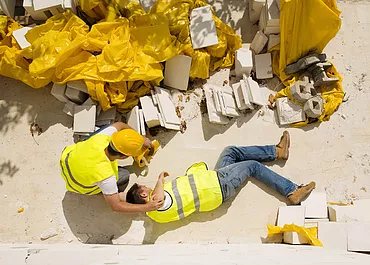Warehouse Accident Claims
Warehouse Racking Accidents
- Types of Warehouse Accident Claims
- Forklift Truck Accident Claims
- Falling Object-Related Injuries
- Slip and Trip Accidents
- Falls from Heights
- Manual Handling Injuries
- Can I Get Fired for Lodging a Claim Against My Employer?
- What to Do If My Employers Insurer Contacts Me?
- How a Claim Advisor Can Help You
- Start Your Claim Today
There are many different types of warehouse accident claims encountered in Scotland. Warehouse employers are required to follow health and safety guidelines to mitigate the risk encountered by employees and visitors. You are eligible to receive compensation if you have been injured because a warehouse owner or staff member failed to adhere to these guidelines. Warehouses have their own unique set of risks that are inherent to their business. Employers must properly train their employees on these risks and the proper safety precautions to follow in the event of a hazardous scenario.
Types of Warehouse Accident Claims
Every business has its unique set of hazards and warehouses are no different. According to the Health and Safety Executive, these are the most common warehouse accidents encountered in Scotland:
Forklift Truck Accident Claims
Forklift trucks are commonly used to move heavy objects around warehousepremises and for many businesses they are an essential part of their backend operations. Employers are legally obligated to provide their staff with the proper training needed to operate a forklift safely.This training must include what measures should be taken in the event of a forklift accident. Employees and customers must be kept out of harm’s way to prevent serious injuries from occurring. When an employer fails in these duties, it is considerednegligence. If the negligence of another party resulted in you being injured,then you are eligible to receive financial compensation for your injuries and suffering.
Falling Object-Related Injuries
There is always an increased level of risk whenever you have heavy items placed on tall shelving. A falling object can cause serious bodily harm if it hits someone. Even if the object doesn’t hit anyone on its fall it still creates a trip hazard for anyone traversing the walkway. Employers are aware of this risk and they must train their employees on the proper safety and prevention precautions to take in order to limit exposure to these dangers. Unfortunately, it is impossible to eliminate this risk from the workplace and even when the proper safety guidelines are being followed, employees and visitors can still be injured because of the unpredictable nature of this accident.

Slip and Trip Accidents
According to the Health and Safety Executive, slips and trips are the most common workplace accidents experienced in Scotland and among the most dangerous. Serious injuries are common with 95% of major slips and trips resulting in broken bones. Wet surfaces, spilled liquids, trip hazards, fallen objects, and uneven flooring all increase this hazard exponentially. Employers must maintain walkways that are free and clear of debris to prevent injuries from occurring. You are eligible to receive compensation if you are injured because of your employer’s negligent behaviour.
Falls from Heights
Warehouse shelving can reach dangerous heights that require the use of a ladder to access. Ladders pose their own unique set of risks that must be monitored to prevent injury. The most common cause of ladder accidents is improper usage such as using the top step or reaching too far. Proper ladder training must be provided to employees prior to usage. Falls from heights can result in head injuries and broken bones. In many instances, the injured party may not be aware of the cause of their accident. A claim specialist can help gather this relevant information and keep you prepared on what to expect next in the claims process.
Manual Handling Injuries
Warehouse staff are expected to handle and move heavy packages which can result in sprains, muscle injuries and back problems. There is also the risk of dropping a heavy item on your foot. These injuries can be severe and at one point they were so prevalent that the HSE created the Manual Handling Operations Regulation 1992. These safety standards were meant to reduce the risk presented to warehouse employees when lifting heavy objects. This was accomplished by requiring the use of forklift trucks, winches, and other leveraging devices whenever possible. It also requires employers to properly train their staff on the correct way to lift heavy objects.

Can I Get Fired for Lodging a Claim Against My Employer?
You should never feel guilty or bad about lodging a claim against your employer. Your employer has been paying insurance premiums for years to cover situations such as these and lodging a claim may be the only way for you to receive financial compensation for your injuries. This compensation may be essential in getting you access to the proper medical care you need to recover properly. The only party that benefits from you not lodging a claim is the insurance company. They get to keep your employer’s premiums and never have to pay out any claims in this scenario. Don’t let the greedy insurance companies continue to prosper at your expense. Claim Solutions Scotland can guide you through the claims process and help you to get the compensation you are seeking.
What to Do If My Employers Insurer Contacts Me?
In some situations, your employer’s insurer may try to contact you with a settlement offer. Although it may look like this is a gesture of good faith, it is important to remember that insurance companies hold a responsibility to their shareholders to increase profits by reducing expenses. These expenses include claims paid out. This can mean your settlement offer is grossly underfunded and can result in future medical cost being paid out of your pocket.
How a Claim Advisor Can Help You
A claim advisor can play a critical role in helping you navigate the subtle nuances of the claims process. Claim specialist can assist in evidence gathering, as well as, communicating with your employer’s insurer. This can help you to focus on the road to recovery. Claim Solutions Scotland Ltd understands how important compensation can be for those injured in a warehouse accident. That’s why we assign each claim a personal claim advisor. They will examine the exact circumstances surrounding your accident and give you a straightforward assessment of the best compensation strategy to follow.
Start Your Claim Today
Contact us and start the claims process today.
